#god apedemak
Explore tagged Tumblr posts
Text
Netkheru reptiles III
Hoy vamos con la parte tres de esta serie llamada ''Netkheru reptiles'', serie donde les hablaré sobre los distintos netkheru y netkherut con características reptilianas, sus correspondencias, sus representaciones y sus asociaciones y/o sincretismos.
¡Comencemos!
9) Apedemak
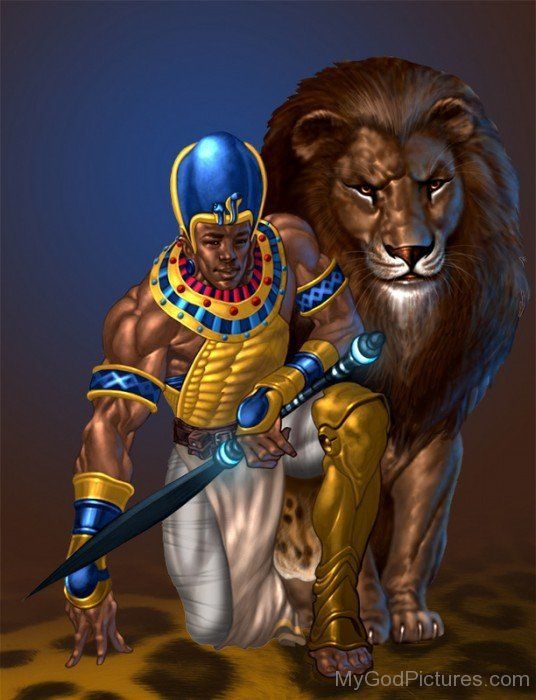
Sincretizado con una netkher cuyo nombre se desconoce, Apedemak es el netkher de las guerras, es representado cómo un hombre con cabeza de león o cómo un hombre con cuatro brazos y tres cabezas de león, pero ¿Qué tiene que ver Apedemak aquí? Bueno, si prestaron atención en los anteriores post de la serie ''Netkheru felinos'' sabrán que Apedemak también era representado con características reptilianas, pues otra de sus representaciones era la de una serpiente con cabeza de león.

10) Heket/Heqet

Netkher asociada a los partos, partera en si misma, la vida, protectora de personas embarazadas y la fertilidad, Heket es quien le da vida a les recién nacides poniendo el Ankh en sus bocas y narices.
Cuando una persona quedaba embarazada, Heket protegía a la vida que estaba dentro y una vez nacida la criatura, la netkher le daría el aliento de la vida.
Es representada cómo una rana o una mujer con cabeza de rana.

11) Kebehut/Kebechet
Imagen: xcrazyvoicex

Personificación del agua fría y asociada al sol y al río Nilo, hija de Inpu (Anubis), Anteriormente vista cómo una netkher celeste, es decir, asociada a los cielos. Kebehut es la netkher funeraria quien protege al faraón y reina en vida y en muerte, les brinda agua despues de la muerte y purifica sus Ba con sus jarrones de agua.
Fue asociada con las netkherut Nebt-Het (Neftis) y Het-Heret (Hathor) en su faceta de funeraria.
Es representada cómo una mujer con cabeza de cobra, portando uno o dos jarrones de agua.
Imagen: hypernosis
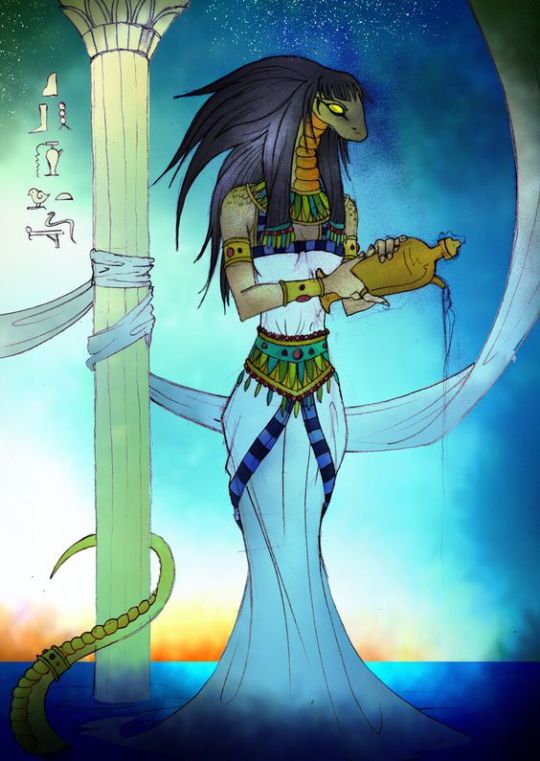
12) Tutu
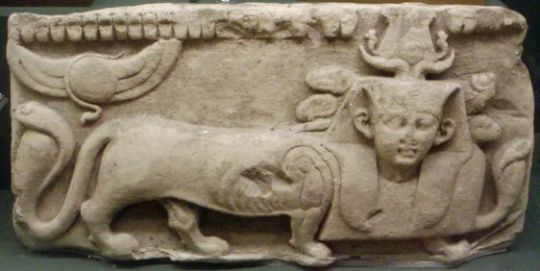
De Tutu también hablamos en post pasados, y es que es el netkher de los demonios y, a su vez, es quién se encarga de ahuyentarlos, se le representa rodeado de demonios, emisarios de Sekhmet, y es representado cómo una esfinge con cola de serpiente, cuerpo de león y cabeza humana y, si recordarán por los post pasados, también se le suele representar con cabezas de halcones y/o de cocodrilos saliendo de su cuerpo.
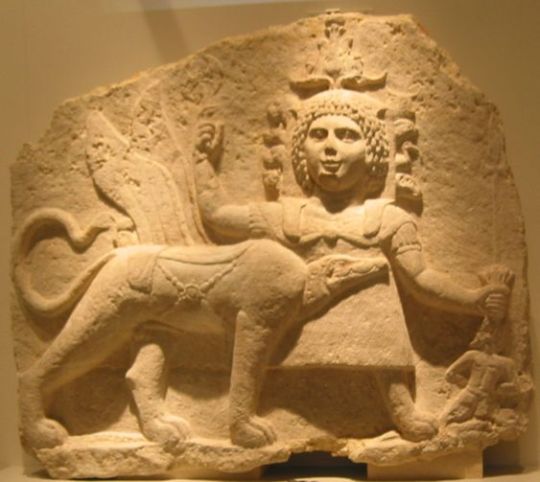
Y bueno, chiques, por hoy ha sido todo, espero que les haya gustado y entretenido, recuerden que todas mis redes sociales y la Per-Ankh están ligados a mi Beacons. Nos veremos en la próxima parte de esta serie, se les quiere mucho ¡Adiós!
#esfinge#pagans of tumblr#tameran wicca#kemetism#tamera#witches of tumblr#pagan witch#paganism#apedemak#god apedemak#Heket#heqet#goddess heket#goddess heqet#Kebehut#Qebehut#Kebechet#goddes Kebehut#goddess Qebehut#goddess Kebechet#Tutu#god Tutu#Ankh#sekhmet#goddess sekhmet#sacmis#goddess sacmis#het heret#hathor#goddess hathor
1 note
·
View note
Photo
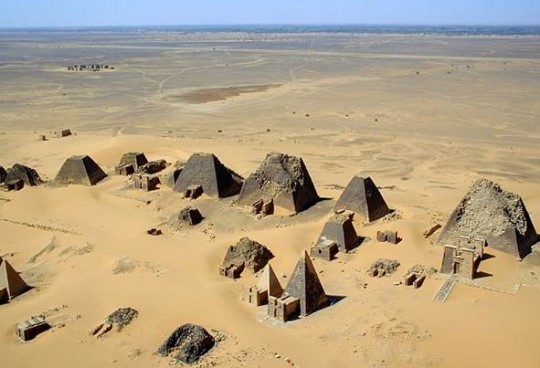
Meroë
Meroe was a wealthy metropolis of the ancient kingdom of Kush in what is today the Republic of Sudan. It was the later capital of the Kingdom of Kush (c. 1069 BCE to c. 350 CE) after the earlier capital of Napata was sacked c. 590 BCE. Prior to that date, Meroe had been an important administrative centre.
The city was located at the crossroads of major trade routes and flourished from c. 750 BCE to 350 CE. Meroe is listed by UNESCO as a World Heritage Site. As no one yet has been able to decipher the Meroitic script, very little can be said for certain on how Meroe grew to become the wondrous city written about by Herodotus circa 430 BCE, but it is known that the city was so famous for its wealth in ancient times that Cambyses II of the Persian Achaemenid Empire mounted an expedition to capture it. The expedition faltered long before reaching the city owing to the difficult and inhospitable terrain of the desert (and, according to some claims, may never have been mounted at all). Still, the persistence of the story of Cambyses' expedition suggests the great fame of Meroe as a wealthy metropolis.
The city was also known as the Island of Meroe as the waters flowing around it made it appear so. It is referenced in the biblical Book of Genesis (10:6) as Aethiopia, a name applied to the region south of Egypt in antiquity meaning "place of the burnt-faces". Although there is evidence of overgrazing and overuse of the land, which caused considerable problems, Meroe thrived until it was sacked by an Aksumite king c. 330 CE and declined steadily afterwards.
Egyptian Influence & King Ergamenes
While there was a settlement at Meroe as early as 890 BCE (the oldest tomb discovered there, that of 'Lord A', dates from that year), the city flourished at its height between c. 750 BCE and 350 CE. The Kingdom of Kush, founded with its capital at Napata, was ruled by Kushites (called "Nubians" by the Egyptians) who, early on, continued Egyptian practices and customs and, though they were depicted in art as distinctly Kushite, called themselves by Egyptian titles. The historian Marc Van De Mieroop writes:
Meroitic culture shows much Egyptian influence, always mixed with local ideas. Many temples housed cults to Egyptian gods like Amun (called Amani) and Isis, but indigenous deities received royal patronage as well. A very prominent Nubian god was the lion-deity Apedemak, a god of war whose popularity increased substantially in this period. Local gods were often associated with Egyptian ones: in Lower Nubia, Mandulis, for example, was considered to be Horus's son. Hybridity is also visible in the arts and in royal ideology. For example, kings of Meroe were represented in monumental images on temples in Egyptian fashion but with local elements, such as garments, crowns, and weapons. (338).
In time, however, these practices gave way to indigenous customs and the Egyptian hieroglyphs were replaced by a new system of writing known as Meroitic. The break from Egyptian culture is explained by the ancient historian Diodorus Siculus who writes that in the time before the reign of King Ergamenes (295-275 BCE), it had been the custom for the high priests of the Egyptian god Amun at Napata to decide who became king and to set the duration of the king's reign.
As the health of the king was tied to the fertility of the land, the priests had the power to determine if the sitting king was no longer fit to rule. If they deemed him unfit, they would send a message to the king, understood to be from the god Amun himself, advising him that the time of his rule on earth was completed and that he must die. The kings had always obeyed the divine orders and had taken their own lives for the supposed good of the people. However, Diodorus continues:
who had received instruction in Greek philosophy, was the first to disdain this command. With the determination worthy of a king he came with an armed force to the forbidden place where the golden temple of the Aithiopians was situated and slaughtered all the priests, abolished this tradition, and instituted practices at his own discretion.
The archaeologist George A. Reisner, who excavated the cities of Meroe and Napata, has famously questioned Diodorus' account calling it "very dubious" and claiming that the Ergamenes story was a national myth which Diodorus accepted as historical truth. Since there is no ancient evidence contradicting Diodorus, however, and since there was clearly a significant cultural break between Meroe and Egypt with Ergamenes' reign, most scholars today accept the account of Diodorus as either certain or something close to actual events.
Continue reading...
167 notes
·
View notes
Note
are you just spiritual or do you believe in different deities as well? Do you believe in monotheism or poly? Some call the deities worshipped by polys to be fallen angels or false gods, any views on this please? I was reading about different ancient deities all around the world and their indian counterparts, Apedemak=narsimha, shiva as atum, and the abrahamic texts consider animaloid deities as fallen angels and not gods. Share your opinions or research please .
I believe that God exists. I don't really believe in a humanoid looking/being God but some kind of superior force that's beyond rational comprehension. I believe in energy. I believe that everything is vibrational. My scientific knowledge is rudimentary at best but the universe does run on energy.
I think different religions and religious philosophies try to comprehend that which is essentially incomprehensible - the great mystery of the universe.
I don't think it's humanely possible to fully understand how we got here or who made us or what exactly is going on up there but through myth and religion, we try to personify and break things down to small meaningful rituals, rules, values, beliefs and ways of living to build our lives around.
Different deities from different religious scriptures are personifications of an inherently abstract concept- the Divine
I think it's powerful to have an intimate connection with an individual deity because the more energy you invest in something, the stronger the connection is and the more enriching and rewarding the experience becomes.
However if you ask me if there's 1028282920 gods up in the sky , I'd say no, it's a bit more complex than that
But I also don't think it's an old man with a long beard and glasses either
God is a state of vibrational being
When we create our reality we work with that godliness but only an ounce of it. God is a million leagues above anything we can conjure up.
12 notes
·
View notes
Text
50+ African gods names and meanings - Tuko.co.ke

African communities have so many gods and goddesses, and each one has its own role to play in life. Some gods and goddesses are for wealth, war, health, healing, protection, death, evil, creation, and so on. Africans who believe in these gods consider it essential to worship and adore these gods and goddesses to have a good and smooth life.
Even though the larger religions such as Christianity and Islam have made big inroads in the African continent, the African gods and goddesses are still worshipped today. Here are the names of African gods:
African god of war
Ogun - Ogun is a god of war who defends the Yoruba tribe and is depicted wearing armor and red eyes.
Kibuka - Kibuka is the Buganda god of war who secures victory in war by taking the form of a cloud, which hovered above his enemies and rained spears and arrows.
Age-Fon - During the days of wars and battles, Agé was called upon to protect and give strength to the warriors, leading them on which paths to take.
Menhit - The war goddess was believed to advance ahead of the Egyptian armies and cut down their enemies with fiery arrows.
Tano - He is the goddess of war and strife for the Ashanti people.
Apedemak - The Nubian lion-headed warrior god.
Takhar - He is the god of justice or vengeance. He is a demi-god in Senegal's Serer religion and is worshipped to protect believers against injury, bad omens, and abuse.
Maher- Ethiopian god of war
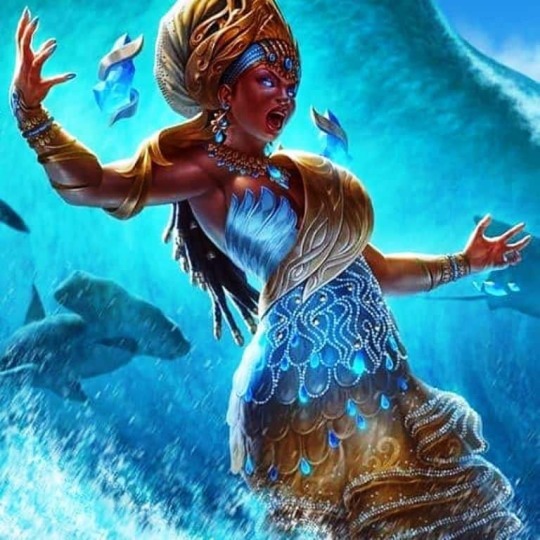
Shango - Shango is the Yoruba god of war and thunder. Oral tradition describes him as powerful, with a voice like thunder and a mouth that spewed fire when he spoke.
Oya - She is the wife of Shango. Oya is a ferocious and protective deity worshipped by the Yoruba. She is the goddess of wind, thunderbolt, and fire.
African god of wealth
Mukasa - He is the brother of Kibuka, the god of war. His main oracular sanctuary was found on an island in Lake Victoria. This god provides rain, food, and cattle.
Oko - Oko is the god of agriculture and fertility. He came to Earth and lived on a small farm, growing some of the most beautiful and delicious fruits and vegetables.
Olokun - Olokun is believed to be the parent of Aje, the orisha of great wealth. He gives great wealth, health, and prosperity to his followers.
Aje - Aje is a traditional goddess of abundance and wealth, often associated with the business of the marketplace in the Yoruba religion.
Oshun - Oshun is a divine being associated with love and fertility, as well as financial fortune in the Yoruba religion.
Ikenga - Ikenga is a personal god of human endeavor, achievement, success, and victory. He is grounded in the belief that a man's power to accomplish things is in his right hand.
Anyanwu - This is the goddess of the sun. She is revered as the goddess that promotes productivity, hard work, and overall positive well-being.
Njoku Ji - This is the guardian deity of yam in Igboland. She is prayed to for productivity during the farming season.
Mami Wata - Mami Wata is famous as the African god of money. The goddess has the power to bestow good fortune and status through monetary wealth.
Wamala - He is the god of wealth and prosperity.
Anayaroli - He is the god of wealth.
Ashiakle - She is a famous goddess of wealth and prosperity in West Africa.
Abena - She is known as the river goddess. Her name is associated with gold, brass, as well as with other wealth symbols.
African god of healing
Agwu - Nsi - This is the god of health and divination. This god is one of the basic theological concepts used to explain good and bad, health and sickness, poverty, and wealth in Igboland.
Osanyin - He is the Yoruba Orisha of herbalism, and he possesses the powers to cure all diseases.
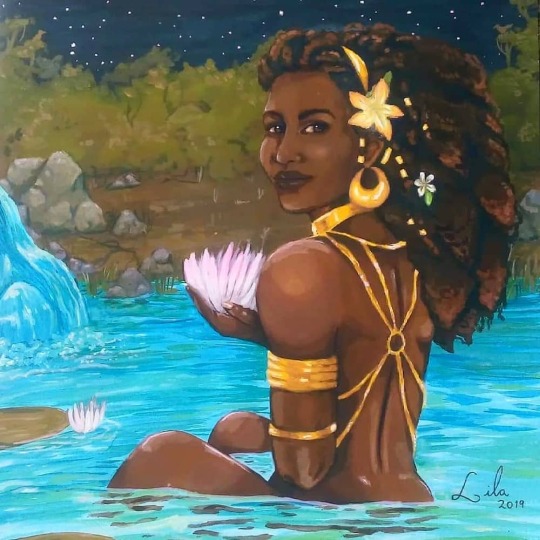
Xu - He is the sky god of the Bushmen in South Africa. Xu is usually invoked during an illness.
Aja - Aja is a powerful healer in Yoruba legend. It is said that she is the spirit who taught all other healers their craft.
Babalu Aye - Babalu Aye is an Orisha often associated with plague and pestilence in the Yoruba belief system. Just as he is connected with disease and illness, he is also tied to its cures.
African evil gods
Amadioha - This is the most popular god in Igboland. He is the god of thunder & lightening. Amadioha is considered a gentleman among the deities and the cruelest when annoyed.
Adroa - Adroa is the god of death with two characters: good and evil. His body is split into two. One half is short and black, which represents evil, while the other half is tall and white and depicts goodness.
Gaunab - He is the Xhosa and Khoikhoi evil god. He is responsible for all misfortune, disease, and death.
Modimo - He represents all the good things. Yet, in the same breath, he had the power to destroy things and bring about natural disasters and devastation.
Ogo - He is the chaos god among the Dogon. Ogo is a horrifically awful trickster god, the embodiment of chaos, and a rebel of horribleness.
African god of death
Anubis - Anubis, the guardian of the dead, is one of the most well-known Egyptian gods. He's mainly depicted as a dog-like figure and leads the dead to Ma'at, where their hearts are weighed.
Ogbunabali - Literally meaning "the one that kills at night." He is known as the death deity. Ogbunabali is known to kill violently.
Gamab - Gamab lives in the sky and directs the fate of mankind. When it's time for someone to die, Gamab gets out his bow and shoots them down with an arrow.
Oya - She is also a goddess of death. Oya is the guardian of the gates of death, as she helps the dead in their transition from life.
African god of creation
Mbombo - Mbombo is the creator god in the mythology of the Kuba people. It is believed that Mbombo was alone, darkness and primordial water covered all the earth. He felt an intense pain in his stomach and then vomited the sun, the moon, and stars.
Olorun - He is the ruler of the sky and the creator of the sun.
Obatala - He is the creator of humans, mountains, valleys, forests, and fields.
Unkulunkulu - He grew from reeds and brought with him people and cattle. Upon his own creation, he created the earth and all of its creatures.
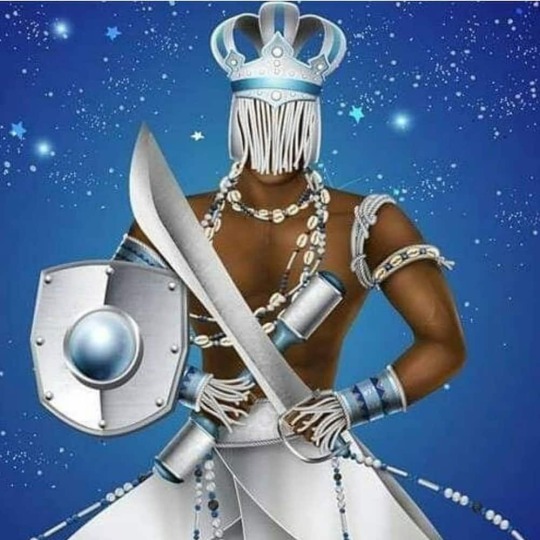
Ra - The sun god arose from Nun, a chaotic body of water that was the only thing in existence. He independently gave birth to Shu, the god of air, and Tefnut, the water goddess. They then produced Geb and Nut, the god of the earth and the goddess of the sky, respectively. The first humans to exist were from Ra's tears.
Kaang - He is the creator god of the universe, according to the San people.
Nana - Buluku - Nana Buluku is the mother of Mawu-Lisa and the goddess of creation. She is associated with the sun and moon.
Odomankoma - This is the name Akan-language speakers use to describe the eternal entity who deserves the credit for the work of creation, including creating the concept of trinity.
Modjaji - She is a South African goddess of rain whose spirits live in a young woman's body. The goddess is considered a key figure as she can start and stop the rain.
African god of fertility
Ala - She is the most respected god in Igboland. The goddess represents the earth, fertility, creativity, and morality.
Oshun - She is one of the most powerful of all orishas in the Yoruba religion. She is associated with water, purity, fertility, love, and sensuality.
Asase Ya - Asase Ya is the Earth goddess of fertility of the Ashanti people of Ghana. She is the wife of Nyame, the Sky deity, who created the universe.
Mbaba Mwana Waresa - She is the Zulu goddess of fertility.
Denka - He is the Dinka god of fertility.
Yemaya - She is the childbirth goddess in the Yoruba religion. She is considered the mother of all since she is the goddess of the living ocean.
Who is the most powerful African god?
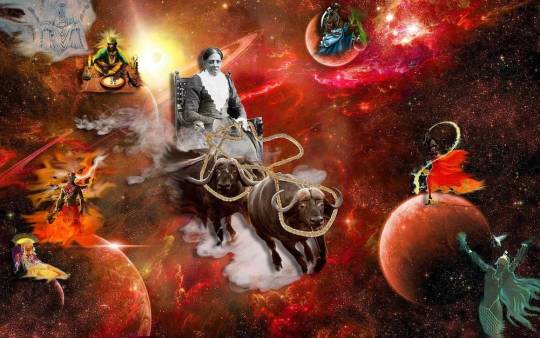
Oshún is a Yoruba orisha, daughter of Yemoja, a Nigerian river goddess. She is the protector of the family and pregnant women. Oshun is typically associated with water, purity, fertility, love, and sensuality. She is considered one of the most powerful of all orishas in the Yoruba religion. She possesses human attributes such as vanity, jealousy, and spite.
There you have it. A comprehensive list of African gods' names and meanings. With the introduction of larger religions such as Islam and Christianity, the concept of African deity is slowly losing its meaning. However, some ethnic communities still believe in and worship these gods and goddesses even today.
Tuko.co.ke published an article about the list of major religions in Africa. Before the white man came to Africa, the African people had a doctrine. Little is known about the ancient African religions. However, it is a fact that all doctrines have common features such as belief in a supernatural power, the belief of life after death and the beliefs surrounding burial.
Research shows that the majority of citizens in Nigeria and Africa as a whole are devoted Christians. The African continent has a variety of religions practised across all regions. In Africa, religiosity has a big influence on arts, culture, lifestyle and traditions of its people.
21 notes
·
View notes
Note
my pride is egypt themed so im naming my lions after gods/deities, and apedemak and menhit are both egyptian deities apparently (apedemak only kind of, he was worshipped in a different religion but was still associated with ancient egypt's religion)? kind of confused why ld would use them in a space/star themed event?? why not just name the npcs after constellations or something? idk im a bit annoyed because theyd be good for my pride but i dont want the association with the npcs :( (before someone says get over it, theyre my lions and my naming scheme. itd feel weird to look at my pride and see their names because i don't associate them with egypt.)
anyway sorry for the yap fest, didnt mean to make it that long. not really pressed about it, im mostly just confused what their reasoning was.
.
1 note
·
View note
Text
Just for fun today, let's share something REALLY old (2014 or so.) If you've been following along reading my chapters, perhaps you'll be interested in seeing how I've improved! This is adult HISTORICAL fantasy, written when I had access to a college library and could get out the big academic books about this time period! Fun times but I've forgotten all my notes and would have to start over with research to rewrite it. So it will probably never happen!
The Scribe and the Sphinx
Chapter 1
Sudan, 340 AD.
It is so strange and unpleasant to be leaving.
My hand traces the engravings on the temple walls before me. My fingers dip into crevasses that mark a lion's roaring head, the head of a god. The temple is quiet around me, dust hanging in the sunbeams that pierce down through the high windows. I'll never see these walls again.
My objections to going home are not sensible, although I claim to be a sensible man. My colleagues satisfied themselves that all texts were found months ago and stopped coming. Most took the camel trains home to Bedewi, where there is a newer Lion Temple, still maintained and attended. But the reliefs in front of me have a power lacked by those decorating the temple at Bedewi. Apedemak's hand cuts down a fleeing enemy, his mouth open in a roar, his mane falling down over human shoulders. Lions cavort at his feet.
There is a noise, out of place and jarring in the silence: the lowing of cows and some animal clattering on the mud-brick road outside. I ignore it. "Great god, great of roaring, strong of arm," I mutter to myself, remembering hymns I have copied. I'll miss it here, among the images of the gods.
Dust tickles my nose, I sneeze, and the moment is broken. I turn away to survey the rest of the temple. A century ago, Aborepi was the jewel of upper Kush, and this small temple would have been richly attended. But now, as we all trickle away from the southern reaches of the nation, it lies untended. The kings and kandakes whose images bow before the gods on these walls are long dead. Most Kushites would not even know who they had been.
I've made records of these carvings, and their names, and collected the writings of the scribes of those times. Even if this part of Kush falls to the barbarian kingdoms to the south, Aborepi won't be forgotten. Not if I have anything to say about it.
I walk through the temple, my sandals loud against the stone floor. A small pile of broken tablets and torn parchments lies in a corner near my bags. This time, I have nothing to add to it. The pile looks tiny and insignificant beneath the carvings of the gods, but I've no regrets for wasting my morning finding these bits and pieces. These are the oldest documents I've found around Aborepi, jammed in corners and edges, long forgotten by the few people who still travel to worship here the way our ancestors did. The rest of the tablets and scrolls I've collected are already back at Tolkte, the nearest inhabited city.
I load this last armful and hoist the bag onto my back. With a last look at the Lion Temple, and a bow to my god, I turn to leave.
It is a short walk out. Every inch of the temple is carved with pictures that I've seen a hundred times before. I ignore them, but a single column near the door catches my eye as I pass. The sunbeam that comes in the window high above casts the relief on it into shadow and light. On the sandstone pillar, a lion with a woman's head and uplifted wings rends a fleeing antelope with her right front paw. On the sphinx's back, a man with a lion's head and the crown of a god stabs down with his spear and slays the antelope's mate. I've never seen a wild lion or a sphinx, and I wonder if I ever did whether Apedemak's hand would truly guide it, as legends say, or if it would swallow me whole and leave my scrolls scattered through the brush.
The front gate stands like a window against the sky, the door long rotted away. The sun is still low in the sky; I left Tolkte this morning to come here before it had properly risen in order to avoid the heat. As I walk through the doorway, for a moment the light strikes me just so that I can see nothing but the blood vessels of my eye against that red glare. When my vision clears, the twin lion statues outside that guard the door come into view. Between them stands a man that I do not know.
I freeze on the threshold as the sense of relaxation the quiet temple gave me flees like water through a drain. The stranger smiles at me, big and bold and unapologetic. His skin is nearly as black as my own, and his teeth are a white slash across his face.
I'm a three hour camel ride from the nearest habitation. He should not be here.
"Lord Scribe?" the stranger says, his white teeth still bared.
I back a step sideways from the door, putting the wall at my back. "What are you doing here?"
He doesn't budge from the doorway, nor dim the intensity of his smile. "I've come from Tolkte to speak with you. The temple told me that you were headed this way." He wears a sturdy kilt, and he is less hungry-looking than many of the people still at Tolkte, but the edge to his face speaks of desperation, and he wears no wig at all over his shaven head. He looks a few years older than me, perhaps twenty-five. If I had seen him at Tolkte, I'd have thought him a beggar, but for the sword on his belt.
I take another step to the side. My only knife is at the bottom of my bag, but I wish it were in my hand. "And you couldn't wait to seek me when I returned this afternoon?"
He shrugs. "Ah. They told me also that you were leaving Tolkte soon, and I thought I should seize the opportunity, Lord Scribe."
I'm not leaving for days. Someone who has spoken with the temple should know that. "I am no lord."
"You're a priest, are you not? Closer to the gods than I? A servant to the people? I'm in need of a servant of the people."
I am a priest, yes, sworn to Apedemak and Thoth, but I'll not tell that to a man who accosts me in the wilderness. Besides, words have called to me more of late than service to anybody. "If you seek a blessing or aid with a hymn, the active temple is back at Tolkte."
His smile broadens, and he shakes his head. "No, no. I seek you. You are Dekeli? You're the collector of words, are you not? The one who listens to the stories of the herders and villagers and the Noba?"
I shift uncomfortably and take another step, since he hasn't stopped me. The edge of the building is not far away. The scrublands beyond are lined with nothing but small acacia trees and the stubble of what was once grass. The great enclosure to the north looms, far larger and more complex than this small temple, but there is nowhere within to hide from a man mad enough to pursue me from Tolkte. "I don't speak with the Noba."
"You trade for tablets and scrolls," he insists, although the Noba have neither.
This man hardly looks like he could inscribe his name. "You have a scroll?"
He shakes his head. "You do. One I will trade very well for."
Suddenly, the pack on my back feels vulnerable, and the wall behind me protective. "I'm not interested, and I don't have any of my scrolls or tablets with me."
He bobs his head at me. "Then I'll come back with you to Tolkte, and I will buy it there. Shall we walk to our camels?" He gestures behind him with a sweep of a well-muscled arm towards the huge, mostly full hafir that long-dead Kushites dug east of the Lion Temple and the great enclosure to the north.
My camel, Wdkid, is tied up near the water. Another camel, small and weedy, now stands beside him. A brown cow lounges between them, its ribs sharp, its belly sunken. The rest of its herd loiters farther down canal, their tails swishing the warm morning air.
I make a break for the camels, but the man jogs easily alongside me.
"Shall we ride back together?" he asks me.
Wdkid ignores me as I approach, his head glued to the water. I gasp, out of breath, "If you want scrolls or hymns written down, you ought to talk to my colleagues that are staying on in Tolkte. They have many skilled scribes there."
He shakes his head. "I want only a specific one. I'll pay you. I know that you have it. You hired my friend to help when you first came here. He saw it."
I start and grab for Wdkid's lead. I know the man he must be speaking of. Early on, before I had learned the way to Aborepi by heart, I hired local guides to bring me here and help carry back the things that we found. I've hired few people to assist me since, not trusting them to handle delicate things, and only one that could read well enough to identify a document to someone else. But I dismissed that man for attempting to steal from me, for tucking a tablet in his bags like a thief and lying that he had ever found it. I trust no one who references him.
I fling my pack up onto the simple stick frame of Wdkid's saddle and yank his lead free from the stake securing it. When I pull his head away from the hafir, he yawns at me and shakes his neck, but then he drops to his knobby, callused knees and suffers to let me mount. As he lurches back to his feet, I stare down at the man. He stands with his hands on his hips, looking up at me with lifted eyebrows.
Up on the camel, some four feet above the man's head, I feel secure. My voice sharpens. "I have collected those artifacts to preserve the history of this place. I will not sell one for any item you could possess!"
The man's lips press tightly together. I pull on Wdkid's reins, too hard, and turn him southeast towards Tolkte. I drive the camel harder than I have ever done and do not look back to see if the man is following me.
***
The city of Tolkte, as I arrive in the early afternoon, is surrounded by camels and a handful of horses. Wdkid lengthens his stride at the sight of them, jouncing me about on his back and rattling the bags of tablets that hang off his sides. I thump the hump beneath me, and he slows back to a brisk trot.
The day is warm now that the sun is high, but there are people and camels all around the city, swarming like an army of termites around a rain-ruined mound. I've not seen so many since the great trains of traders that passed between kingdoms stopped coming, nearly three years ago. It's puzzling activity, frantic but clearly purposeful. After my encounter with the strange man, it makes me nervous. I survey the train and spot a caravan master I know in the middle of the mess. I frown. I've paid the same man to escort me back to Bedewi in two day's time. There's no way he should be preparing to leave. I give Wdkid his head and bear a few more minutes of his neck-rattling gait before he reaches the crowd.
I guide Wdkid into the press of people, confident his size will let us push through. He has a bad habit, which I was the only reason I bought him so cheap, of shoving people with his neck when they come too close to him. I trained him out of doing it to me, mostly with bribes, but he's not so gentle with strangers. We wade into the crowd like a lion through brush.
After being cursed at for the sixth time and Amun's name being invoked against me and my pestilent camel for the third, I reach the side of the caravan master. His broad back is turned to me as he argues with some of the men under his command. One, I remember, is named Bleli. The tall, lithe man is a good-natured second to the harsher caravan master, whose name escapes me. Bleli sees me up on Wdkid's saddle, clinging like a tick to a dog's back. He smiles, but the smile is strained at the edges.
I order Wdkid to cush and hop down from his back when the camel kneels. A couple of long strides, and I confront the pair. I'm not quite as tall as Bleli, but I have the breadth on him, and if I haven't the caravan master's bulk, at least I am taller. "What is all this commotion? You can't be planning a trip before our departure. You'd hardly have time to get back before we left."
At the sound of my voice, the caravan master turns slowly, his hands creeping up to rest on his hips. He's a big man. His belly fat, bronze armlets and fine black wig suggest he is very successful at parting people from their trade goods. But his kilt looks too big on him now, and he's tightened his rope belt past its first notch and tied it shut. He narrows his eyes at me, and a muscle twitches in his cheek. "Not before your departure, no." He jerks his head towards Bleli. "Talk to him and explain things. I have people to oversee." He strides away, leaving me alone with Bleli, and the rest of his men trail after him like camels in a chain.
Bleli tugs at a lock of his curly black hair, which is real hair, unlike his master's. His head is unshaven and covered in shoulder-length locks, as the herders and poorest of farmers keep it, and he has a mustache and beard. I wonder whether he came from such a poor background, or if he simply keeps too busy to maintain proper hygiene. My own hair, already long enough to curl about my ears, is in bad need of a trim.
"Dekeli," Bleli says. "You're late. We were just discussing our plans. It is good that you've come in time."
I frown at him and hang onto Wdkid's lead as he's jostled by passersby and jolts up to his feet in response. "Late? The sun is still well up. The moon doesn't yet peek over the horizon. I think that I'm home well in time to stop by the temple and have a good dinner."
His slight grimace unnerves me. "You're late," he repeats. "If you had come another hour later, we would have left without you."
@anonymousfoz
@moremysteriesthantragedies
@elizababie
@sm-writes-chaos
@bellascarousel
@palebdot
@hyba
@da-na-hae
@macabremoons
@the-dragon-chronicler
6 notes
·
View notes
Text
0 notes
Text
@flameandigniteite said: https://the-rose-thief.tumblr.com/post/691515901444505600/theres-an-odd-sort-of-pluralism-you-see-often-in
I saw this and immediately thought about how Esme, a known catholic who very much believes in god and all that stuff, has also literally seen Davy Jones and quite possibly also knows that Calypso exists
yes ! I think that's one of the most interesting aspects about her character, and at least partially the reason she doesn't sacrifice that catholic faith is that witnessing the divinity of the sea like jones and calypso reinforces belief in a being of a higher power than the power of or understanding of man. ( although of course she adopts the perspective that the catholic God is one of many such beings, and perhaps even a being that has no power at sea. ) I don't know that her mexica faith is particularly strong, at least not as strong as the catholicism in which she was trained, but she certainly holds place for indigenous practice in her belief system, and believes in the curse they placed on cortés' gold, for instance.
it's also one of the reasons that her beliefs about death are so complicated. hanging feels like a reckoning with the catholic god, whereas dying in battle or during childbirth might be a reckoning with the mexica pantheon, while dying at sea is primarily in the authority of gods like calypso or other nautical deities/semi deities. so her opinion and relative confidence can change quite drastically depending on the situation of her death. day-to-day prayer is directed at the catholic god alone, but then again most sea deities don't demand prayer in the same way (at least not in esme's modern day), but rather these displays of faith have manifested in certain practices and sailor superstitions
#this doesn't relate directly to esme but it's interesting that tpof shows apedemak as real and taking a relationship towards amenirdis#almost like the catholic god and the patriarchs ?? ( not quite but. that kind of protective - spiritual mentor one to one relationship )#and that amenirdis and esmeralda and robby are all so godly and yet jack is not.#✘; LETTERS ( answered )#flameandignite
2 notes
·
View notes
Text
Egyptian Deities
Goddesses
Amunet : Goddess of creation, protector of the kings.
Anuket : Goddess of the cataracts of the Nile and fertility.
Bastet : Goddess of protection, cats, perfume/ointments, fertility, pregnancy, children, music, the arts, and warfare. Symbols : feathers, cats.
Hathor : Goddess of the sky, the sun, sexuality and motherhood, music and dance, foreign lands and goods, and the afterlife.
Heqet : Goddess of protection of women in childbirth, fertilily.
Isis : Goddess of funerary rites, motherhood, protection, and magic.
Maat : Goddess of truth, justice, and order.
Menhit : Goddess of war and crown.
Mut : Mother goddess.
Neith : Goddess of creation and hunter.
Nekhbet : Goddess of protection. Symbols : Vulture.
Nephthys : Goddess of mourning, the night/darkness, service, childbirth, the dead, protection, magic, health, embalming, and beer.
Nepit : Goddess of grain.
Nut : Goddess of the sky, stars, cosmos, mothers, astronomy, and the universe.
Pakhet : Sun goddess of war, hunter and protection.
Renenutet : Goddess of nourishment and the harvest.
Satis : Goddess of war, hunting, and fertility.
Sekhmet : Goddess of the sun, war, protection and healing.
Tefnut : Goddess of moisture.
Wadjet : Goddess of protection.
Gods
Aker : God of the earth, underworld and the horizon. Symbols : Lion, sun disk.
Amun : Creator god, patron deity of the city of Thebes.
Am-heh : God of the underworld.
Anhur : A god of war and hunting. Symbols : feathers, spear, lance, lion.
Ani : God of festivals.
Anubis : God of death, mummification, embalming, the afterlife, cemeteries, tombs, and the Underworld. Carries the dead to the judgement place of the Underworld. Symbols : canine, wolf.
Apedemak : Warior god.
Apophis : God of chaos. Symbols : flint, snakes, crocodiles.
Aten : God of the sun disk, creator, giver of life, and nurturing spirit.
Atum : Creator god and solar deity.
Baal : God of the sky and storms.
Babi : God of the underworld, agressions, destruction, judgement, virility and sexuality of the dead in the underworld.
Bennu : Solar god of creation and rebirth. Symbols : heron.
Geb : God of the earth.
Hapi : Personification of the Nile flood.
Horus : A major god, god of the sky, the sun, kingship, protection, and healing. Symbols : Falcon.
Khepri : God of the rising sun, renewaland creation. Symbols : scarab beetle.
Khnum : God of creation, the source of the Nile, the patron deity of Elephantine. Symbols : Ram.
Khonsu : God of the moon, travelling, healing and protection. Symbols : falcon.
Maahes : God of war, weather and protection. Symbols : knives, lotus, lion.
Min : God of agriculture, fertility, sexuality and virility. Symbols : lettuce
Montu : God of war and the sun. Symbols : curved sword, spear, bow and arrows, knives, falcon, bull.
Nefertum : God of the lotus blossom. Symbols : lotus, lion, cat.
Neper : God of grain.
Osiris : God of fertility, agriculture, the afterlife, the dead, resurrection, life, and vegetation.
Ptah : Creator god and patron of craftsmen and architects.
Ra : God of the sun, order, kings and the sky. Symbols : falcon.
Set : God of deserts, storms, disorder, violence, and foreigners. Symbols : donkeys.
Shu : God or peace, lions, air and wind.
Sobek : God of protection. Symbols : crocodile.
Sopdu : God of the sky and of Egypt's eastern border regions.
Thoth : God of the moon, writing and scribes, and patron deity of Hermopolis.
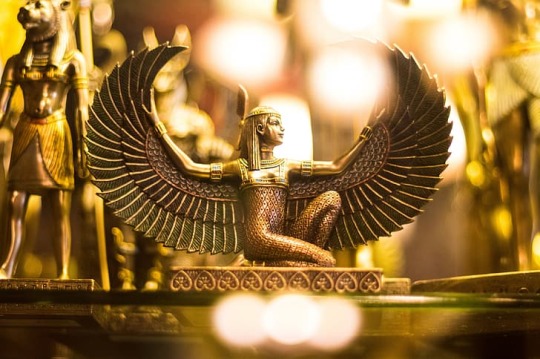
#egytian#egyptian pantheon#egyptian religion#egyptian mythology#egyptian gods#pagan gods#gods#ancient gods#ancient egypt#paganism#pagans of tumblr
809 notes
·
View notes
Photo

Apedemak, the Nubian god of war by Hazem Ameen
16 notes
·
View notes
Text
Images
So um I may have 'made' something. u/Eternalspace1969 made images of many egyptian deities and posted them on Reddit for free use. Considering there were none of Apedemak and Aman I decided to try my hand at editing some of his images to make their representations. So here they are!
Lord Apedemak

Lord Aman

and Lady Amesemi

He has uploaded his own drawings on wikimedia, I really recommend checking them out!
#kushite polytheism#kingdom of kush#kushite paganism#kushite religion#kushite gods#kushite#the kingdom of kush#lord apedemak#apedemak#apedemak deity#aman#lord aman#aman deity#amun#amun-ra#kemetic#pagan#paganism#polytheism#polytheist#drawing
16 notes
·
View notes
Text
A comprehensive list of famous 50+ African gods names and meanings
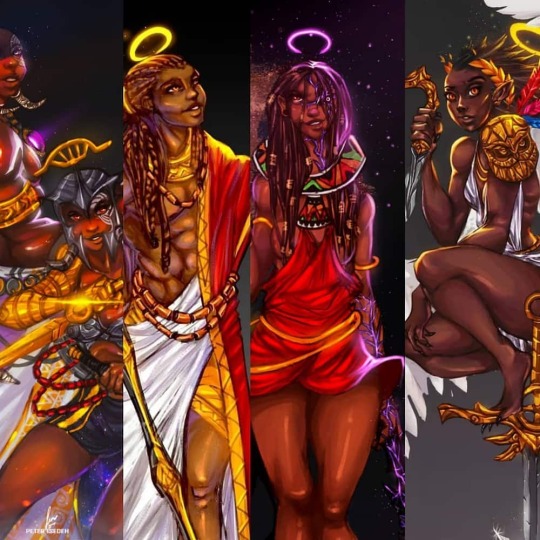
African communities have so many gods and goddesses, and each one has its own role to play in life. Some gods and goddesses are for wealth, war, health, healing, protection, death, evil, creation, and so on. Africans who believe in these gods consider it essential to worship and adore these gods and goddesses to have a good and smooth life.
Even though the larger religions such as Christianity and Islam have made big inroads in the African continent, the African gods and goddesses are still worshipped today. Here are the names of African gods:
African god of war
Ogun - Ogun is a god of war who defends the Yoruba tribe and is depicted wearing armor and red eyes.
Kibuka - Kibuka is the Buganda god of war who secures victory in war by taking the form of a cloud, which hovered above his enemies and rained spears and arrows.
Age-Fon - During the days of wars and battles, Agé was called upon to protect and give strength to the warriors, leading them on which paths to take.
Menhit - The war goddess was believed to advance ahead of the Egyptian armies and cut down their enemies with fiery arrows.
Tano - He is the goddess of war and strife for the Ashanti people.
Apedemak - The Nubian lion-headed warrior god.
Takhar - He is the god of justice or vengeance. He is a demi-god in Senegal's Serer religion and is worshipped to protect believers against injury, bad omens, and abuse.
Maher- Ethiopian god of war
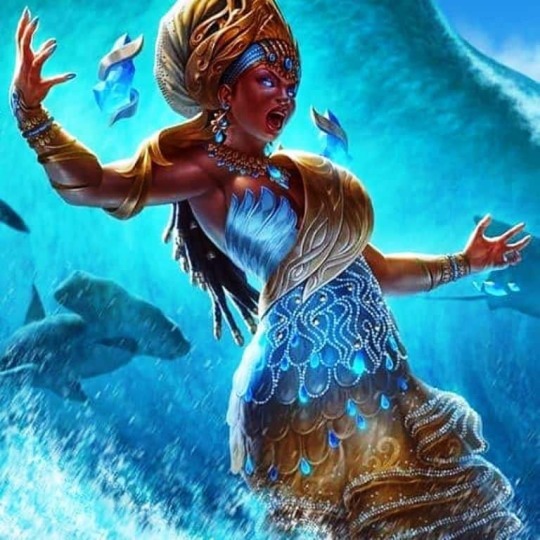
Shango - Shango is the Yoruba god of war and thunder. Oral tradition describes him as powerful, with a voice like thunder and a mouth that spewed fire when he spoke.
Oya - She is the wife of Shango. Oya is a ferocious and protective deity worshipped by the Yoruba. She is the goddess of wind, thunderbolt, and fire.
African god of wealth
Mukasa - He is the brother of Kibuka, the god of war. His main oracular sanctuary was found on an island in Lake Victoria. This god provides rain, food, and cattle.
Oko - Oko is the god of agriculture and fertility. He came to Earth and lived on a small farm, growing some of the most beautiful and delicious fruits and vegetables.
Olokun - Olokun is believed to be the parent of Aje, the orisha of great wealth. He gives great wealth, health, and prosperity to his followers.
Aje - Aje is a traditional goddess of abundance and wealth, often associated with the business of the marketplace in the Yoruba religion.
Oshun - Oshun is a divine being associated with love and fertility, as well as financial fortune in the Yoruba religion.
Ikenga - Ikenga is a personal god of human endeavor, achievement, success, and victory. He is grounded in the belief that a man's power to accomplish things is in his right hand.
Anyanwu - This is the goddess of the sun. She is revered as the goddess that promotes productivity, hard work, and overall positive well-being.
Njoku Ji - This is the guardian deity of yam in Igboland. She is prayed to for productivity during the farming season.
Mami Wata - Mami Wata is famous as the African god of money. The goddess has the power to bestow good fortune and status through monetary wealth.
Wamala - He is the god of wealth and prosperity.
Anayaroli - He is the god of wealth.
Ashiakle - She is a famous goddess of wealth and prosperity in West Africa.
Abena - She is known as the river goddess. Her name is associated with gold, brass, as well as with other wealth symbols.
African god of healing
Agwu - Nsi - This is the god of health and divination. This god is one of the basic theological concepts used to explain good and bad, health and sickness, poverty, and wealth in Igboland.
Osanyin - He is the Yoruba Orisha of herbalism, and he possesses the powers to cure all diseases.
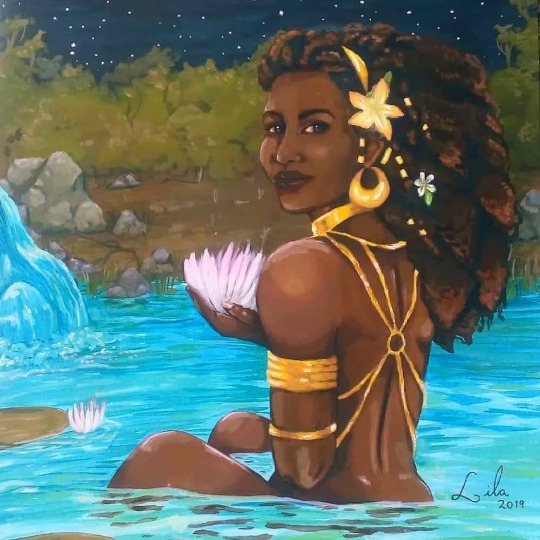
Xu - He is the sky god of the Bushmen in South Africa. Xu is usually invoked during an illness.
Aja - Aja is a powerful healer in Yoruba legend. It is said that she is the spirit who taught all other healers their craft.
Babalu Aye - Babalu Aye is an Orisha often associated with plague and pestilence in the Yoruba belief system. Just as he is connected with disease and illness, he is also tied to its cures.
African evil gods
Amadioha - This is the most popular god in Igboland. He is the god of thunder & lightening. Amadioha is considered a gentleman among the deities and the cruelest when annoyed.
Adroa - Adroa is the god of death with two characters: good and evil. His body is split into two. One half is short and black, which represents evil, while the other half is tall and white and depicts goodness.
Gaunab - He is the Xhosa and Khoikhoi evil god. He is responsible for all misfortune, disease, and death.
Modimo - He represents all the good things. Yet, in the same breath, he had the power to destroy things and bring about natural disasters and devastation.
Ogo - He is the chaos god among the Dogon. Ogo is a horrifically awful trickster god, the embodiment of chaos, and a rebel of horribleness.
African god of death
Anubis - Anubis, the guardian of the dead, is one of the most well-known Egyptian gods. He's mainly depicted as a dog-like figure and leads the dead to Ma'at, where their hearts are weighed.
Ogbunabali - Literally meaning "the one that kills at night." He is known as the death deity. Ogbunabali is known to kill violently.
Gamab - Gamab lives in the sky and directs the fate of mankind. When it's time for someone to die, Gamab gets out his bow and shoots them down with an arrow.
Oya - She is also a goddess of death. Oya is the guardian of the gates of death, as she helps the dead in their transition from life.
African god of creation
Mbombo - Mbombo is the creator god in the mythology of the Kuba people. It is believed that Mbombo was alone, darkness and primordial water covered all the earth. He felt an intense pain in his stomach and then vomited the sun, the moon, and stars.
Olorun - He is the ruler of the sky and the creator of the sun.
Obatala - He is the creator of humans, mountains, valleys, forests, and fields.
Unkulunkulu - He grew from reeds and brought with him people and cattle. Upon his own creation, he created the earth and all of its creatures.
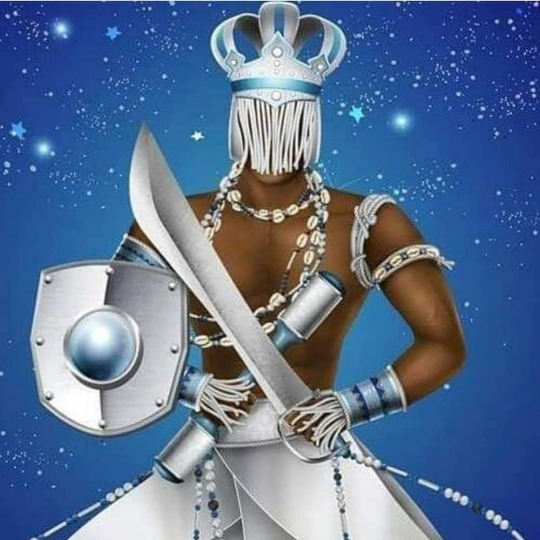
Ra - The sun god arose from Nun, a chaotic body of water that was the only thing in existence. He independently gave birth to Shu, the god of air, and Tefnut, the water goddess. They then produced Geb and Nut, the god of the earth and the goddess of the sky, respectively. The first humans to exist were from Ra's tears.
Kaang - He is the creator god of the universe, according to the San people.
Nana - Buluku - Nana Buluku is the mother of Mawu-Lisa and the goddess of creation. She is associated with the sun and moon.
Odomankoma - This is the name Akan-language speakers use to describe the eternal entity who deserves the credit for the work of creation, including creating the concept of trinity.
Modjaji - She is a South African goddess of rain whose spirits live in a young woman's body. The goddess is considered a key figure as she can start and stop the rain.
African god of fertility
Ala - She is the most respected god in Igboland. The goddess represents the earth, fertility, creativity, and morality.
Oshun - She is one of the most powerful of all orishas in the Yoruba religion. She is associated with water, purity, fertility, love, and sensuality.
Asase Ya - Asase Ya is the Earth goddess of fertility of the Ashanti people of Ghana. She is the wife of Nyame, the Sky deity, who created the universe.
Mbaba Mwana Waresa - She is the Zulu goddess of fertility.
Denka - He is the Dinka god of fertility.
Yemaya - She is the childbirth goddess in the Yoruba religion. She is considered the mother of all since she is the goddess of the living ocean.
Who is the most powerful African god?
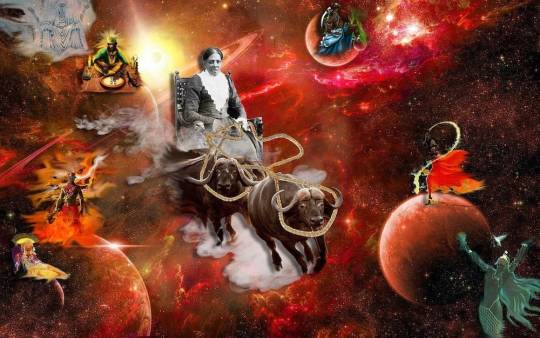
Oshún is a Yoruba orisha, daughter of Yemoja, a Nigerian river goddess. She is the protector of the family and pregnant women. Oshun is typically associated with water, purity, fertility, love, and sensuality. She is considered one of the most powerful of all orishas in the Yoruba religion. She possesses human attributes such as vanity, jealousy, and spite.
There you have it. A comprehensive list of African gods' names and meanings. With the introduction of larger religions such as Islam and Christianity, the concept of African deity is slowly losing its meaning. However, some ethnic communities still believe in and worship these gods and goddesses even today.
Tuko.co.ke published an article about the list of major religions in Africa. Before the white man came to Africa, the African people had a doctrine. Little is known about the ancient African religions. However, it is a fact that all doctrines have common features such as belief in a supernatural power, the belief of life after death and the beliefs surrounding burial.
Research shows that the majority of citizens in Nigeria and Africa as a whole are devoted Christians. The African continent has a variety of religions practised across all regions. In Africa, religiosity has a big influence on arts, culture, lifestyle and traditions of its people.
3 notes
·
View notes
Text
List of Egyptian Gods
Not a complete listing, but this is the majority of them and their rulerships:
Primordial gods:
Atum - god of the Sun; the All-Maker of the Universe, gods, and life
Ptah - god of wisdom, creativity, pottery, artwork, architecture, rebirth, and craftsmanship
Nun - god of the primordial waters
Naunet - goddess of the primordial waters; counterpart to Nun
Tatenen - god-personification of the mound of earth on the waters of Nun at the beginning of time
Tefnut - goddess of wet air, moisture, dew, and rain
Shu - god of dry air, wind, light, and peace; twin brother/consort of Tefnut
Nuit - goddess of the sky, cosmos, astronomy, motherhood, and the Universe; wife of Geb
Geb - god of the earth and fertility; husband of Nuit
Significant gods:
Amun - god of the Sun, generosity, and air; synchronized with Ra to become Amun-Ra, King of the Gods
Ra - god of the Sun, sky, order, and kingship; King of the Gods; said to be a form of Atum
Osiris - god of the Underworld, death, fertility, agriculture, vegetation, and rebirth; husband of Isis; King of the Dead
Isis - goddess of magic, life, compassion, death, rebirth, fertility, motherhood, childbirth, devotion, royalty, knowledge, protection, abundance, healing, and the elements; Queen of the Gods, wife of Osiris
Horus - god of the sky, war, hunting, and kingship
Set - god of chaos, mischief, storms, deserts, battle, danger, virility, and foreign lands
Hathor - goddess of love, compassion, beauty, women, motherhood, childbirth, fertility, joy, music, dance, alcohol, festivity, and the cosmos
Sekhmet - goddess of war, destruction, blood-lust, plagues, healing, the Sun, and divine wrath
Nephthys - goddess of death, mourning, darkness, childbirth, burial, and air
Anubis - god of death, mummification, embalming, tombs, cemeteries, and the Underworld
Thoth - god of knowledge, wisdom, writing, magic, truth, integrity, time, and the Moon
Ma’at - goddess of truth, justice, harmony, wisdom, morality, balance, and divine order Seshat - goddess of knowledge, wisdom, writing, languages, books, mathematics, science, astronomy, astrology, calculations, architecture, and surveying; daughter of Thoth and Ma’at
Bast - goddess of domesticity, cats, family, children, pregnancy, women’s secrets, fertility, pleasure, sex, music, the arts, protection, perfume, fire, sunrise, and war
Taweret - goddess of childbirth, fertility, and protection
Ammit - goddess of retribution
Sobek - god of sovereignty, military prowess, strength, fertility, medicine, surgery, protection, and water
Serqet - goddess of protection, healing, and venomous creatures
Neith - goddess of creation, war, weaving, wisdom, motherhood, childbirth, hunting, water, fate, and the cosmos
Qetesh - goddess of maidens, beauty, and nature
Khonsu - god of the Moon and healing
Wepwawet - god of war, hunting, and death; brother of Anubis
Additional gods:
Aken - ferryman god of the dead
Anat - goddess of war, sex, beauty, fertility, and hunting; originated from Canaan
Astarte - goddess of sex, passion, war, beauty, fertility, and the stars; sister of Anat, originated from Canaan
Aker - god of the horizon
Am-Heh - the “eater of eternity” god who lives in the Underworld’s lake of fire
Amunet - goddess of air and invisibility; female counterpart of Amun
Amunhotep - god of healing and wisdom
Andjety - god of fertility
Anhur - god of war
Anqet - goddess of fertility
Anti - hawk god of Upper Egypt
Anuket - goddess of war, fertility, lust, and Nile cataracts
Apedemak - god of war
Asclepius - god of healing
Ash - god of the Libyan desert and oases
Aten - god of the Sun
Apep - snake-god of evil
Ba’al - god of storms, war, fertility, weather, and seasons; originated from Canaan
Babi - god of virility
Ba-Pef - god of terror, especially spiritual terror
Bat - goddess of fertility and success
Bennu - god of the Sun and rebirth
Bes - god of childbirth, fertility, sex, humour, and war
Denwen - dragon god of fire and destruction
Fetket - god of bartenders; assistant of Ra
Duamutef - protective god of the canopic jar of the stomach; son of Horus
Hapi - god of fertility and the Nile; protected the canopic jar of the lungs
Imsety - protective god of the liver canopic jar
Qebehsenuef - protective god of the canopic jar of the intestines
Heh - god of eternity; feminine counterpart is Hauhet
Heqet - frog goddess of fertility and childbirth
Heka - god of magic and medicine
Heset - goddess of food, drink, beer, and merriment
Hu - god of the voice; personification of Ra’s first words of creation
Ihy - god of music and joy; son of Hathor and Horus the Elder
Kek - god of obscurity, night, and darkness; feminine counterpart is Kauket
Khnum - ram god of pottery, fertility, and virility
Maahes - lion god of the Sun and war; son of Sekhmet
Mafdet - feline goddess of justice and protection against venom
Merit - goddess of music who conducted the symphony of cosmic order
Meskhenet - goddess of childbirth and destiny who created the ka (spirit)
Nefertem - god of the blue lotus, perfume, aromatic healing, and the dawn
Nehebu-Kau - god who units the ka with the ba at one’s death
Neper - god of grain and the harvest
Renenutet - cobra goddess of nursing, fertility, and childbirth
Reshep - god of war and pestilence; originated from Canaan
Sepa - centipede god of protection
Serapis - a Greco-Egyptian god of fertility, vegetation, and the afterlife
Shentayet - goddess of widows
Shezmu - god of drunkenness, wine, perfume, and abundance
Tenenit - goddess of beer, brewing, and childbirth
Wadjet - cobra goddess of protection
1K notes
·
View notes
Note
"Alright new discussion topic: What is everyone’s favorite (and least favorite) event?"
May, just because I'm fond of the characters and aesthetic of it, plus I love the tournament mechanic, April because my god we need a sweet little simple break event after February and March LMAO and December because of the warm energy and community aspects that come with it.
Least favorites have to be March and July, probably? I don't know why I just don't like July's event, all of the NPCs fall flat for me. Apollyon and Menhit bore me half to death, and Apedemak's whole deal before they changed things were? Ick.
November's a bit boring, but I know they can come up with something creative for it, I swear. January used to be my least favorite until they brought in the fun pirate stuff, I fully believe they can come up with something cool and new for November. Maybe something having to do with the Dynasty, or past kings? Idk. Let my lion trip balls and have new event encounters that drop certain items, sorta like October has Rabies. Maybe a bit more of a storyline about the Shaman NPCs we see. Literally anything to spice it up just a little bit more to make it more interesting.
.
5 notes
·
View notes
Photo



-Uttu, Mesopotamian goddess of weaving, associated with spiders.
-Apedemak, Kushite god of war depicted as a man with three lion heads and four arms, and as a lion-headed snake.
-Men, Anatolian god of the moon.
#mesopotamian mythology#egyptian mythology#Greek Mythology#uttu#Enki#apedemak#men#Tears from the Heavens#oc
5 notes
·
View notes
Text
Adoration of Apedemak
O, Apedemak, Three Headed Lion of Naqa, Mighty protector of the Kings of Napata. Your flaming breath engulfs Isfet, O, Strong Arm, Great Lord, defend your followers from harm!
24.05.17
33 notes
·
View notes